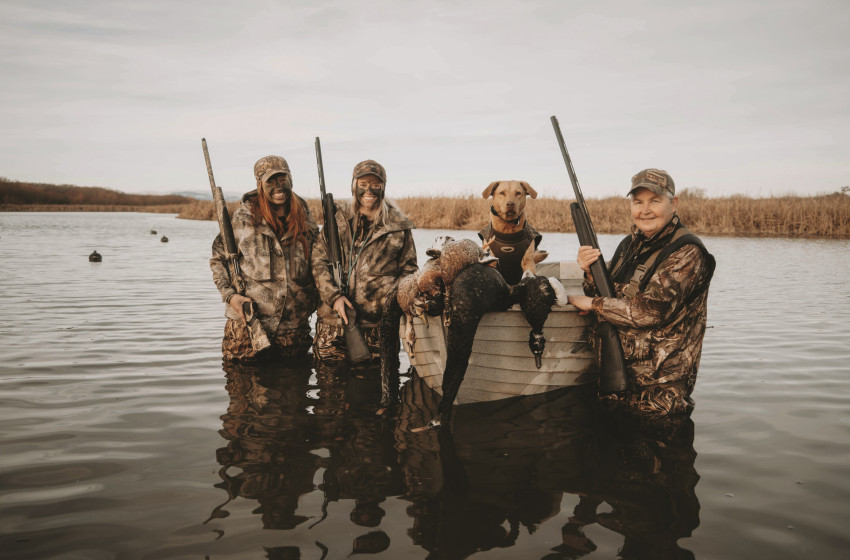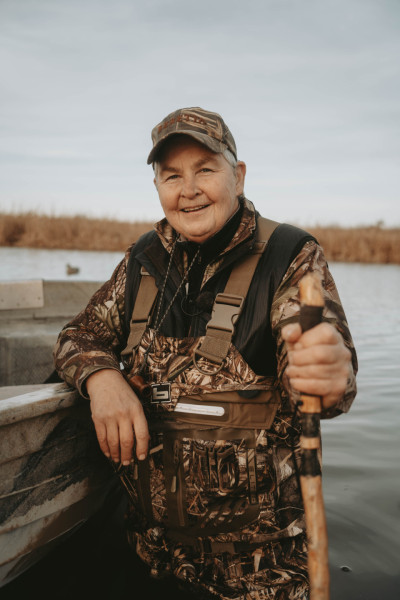Dame Lynda Topp hunts for health, hope and happiness
- 3/04/2024

Hunting and fishing can’t cure cancer but they sure can help you cope with it, as Dame Lynda Topp sees it.
Having tests done and waiting for her cancer diagnosis in December 2021, she told her doctor she was going bush and would check in on her return.
“You know I'm a bit worried, a bit anxious and all that kind of stuff. I got home packed all my fly fishing gear in the truck, picked up my mate and off we went. But I never even got anxious once. I never thought about cancer or was worried about anything, because I was out in the wilds, in the sun and the wind and catching fish.“
“You have to be in the moment. You're pitting yourself against the elements and all those things. So it becomes a whole experience from the environment to what the weather’s doing. You haven't got time to be worried about cancer.”
On her return home to Methven where she lives with wife Donna she got the news, but first she was praised by the oncologist for the beauty of a trout she’d caught. The next period of treatment was tough.
“That was one of the things that I really missed, that I couldn't get out there.”
Half of the performing duo the Topp Twins, getting out in nature is vital for Dame Lynda, and she lives by a philosophy of four Hs: health, hope, hunting and happiness.
She says you need health to get out hunting, have the hope of harvesting something, be able to hunt and the three combined bring happiness.
“So, yeah, it's a simple little thing, and look everybody can make up their own idea of what makes them happy, but I just think they can make me happy.”
Out the other side of her treatment, and living with side effects from chemo like neuropathy that has left her with numbness in her feet, Dame Lynda is looking forward to going hunting this season with her two beautiful Labradors, Rosy and Dream, bred for hunting pheasant and grouse.
Dream is a dream and can hit 60kmh and loves to work off the gun while Rosy loves the water and sits happily in the maimai until it’s time to retrieve and leaves nothing behind.

“And that's always good to have a dog that wants to do that because we want to make sure we pick up all the ducks, make sure they're all gathered up and then we do all sorts of different things with them.”
While Dame Lynda catches and releases trout, she uses the ducks she hunts to make salami and pâté, and she strongly believes it’s important to treat everything with respect. It’s part of her environmental and sustain able approach to hunting.
“That's something the team that I go out hunting ducks with believe in. It's a great time, it's a great social time for people too. But it’s also a really awesome way of managing an introduced species because every introduced species must be managed in a way that they are sustainable but don't impact native species.
“So hunting is not only a great time to get together with friends but also very important environmentally for this country.”
Dame Lynda is a trustee for Hunters for Conservation which aims to fund hunting and fishing as a way of managing species rather than rely on the Department of Conservation.
“There's well over 100,000 people out there hunting so that's a pretty big team...You can come together and be not only hunters but really acknowledge yourselves as being part of the conservation team in New Zealand.”
The Hunters for Conservation mission is one Dame Lynda has lived from a young age. She and twin sister Jools grew upon a dairy farm near Huntly in Waikato. When they were about 13 they and a local lad got into hunting helping a neighbour, Des, cull goats on a nearby station.
“He taught us some really basic but very important survival skills out in the bush. We used to get home from school on a Friday afternoon, we'd race inside and we'd get a pair of football shorts on, some long socks and some gumboots and a couple of peanut butter sandwiches, and then we wouldn't be home until Sunday evening.”
“No telescopic sights, you were only allowed a single shot twenty-two for safety reasons. You only need one bullet and if you miss with that one you learn how to load pretty quickly.”
They slept where they were at the end of the day.
“We were just country kids you know, we just wanted to be out in the woods out in the bush, and Des was our amazing teacher and guide. If you think about trying to do something like that now would be quite difficult in some ways.”
But she urges people, particularly with kids, to give it a go and this is a key reason she got in behind Fish & Game’s ReWild campaign. She’s also keen to see more women get outdoors but says whoever it is they need to have “the gene” and be able to pull the trigger.
“So that's the first thing but if you're a woman and you want to go hunting then you can ask for help if you know nothing about it.”
She recommends going with a mate, whether it’s hunting or fishing, for help but also as it can be a barrier for women to go into isolated places on their own.
“So that's one of the main problems that we find and some of us women are just trying to step up now and say ‘let’s see if we can get a team of women who all take other women out. We’ve got to pass on all that knowledge that we have’.
“But I think if you're keen and you've got that gene and you want to do it you'll find a way to get out there.”
Read more about Dame Lynda and Dame Jools in their best-selling book, Untouchable Girls